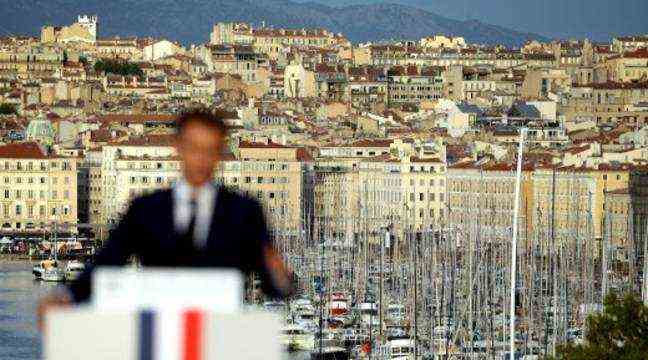He said it over and over: a few months before the presidential election, Emmanuel Macron wants to make Marseille his open-air laboratory. In an interview with Provence on the last day of the visit, the President of the Republic hammered home the point, evoking the desire to make Marseille a “demonstrator”. A strategy that is more a matter of political communication than of the will – if not the possibility – to profoundly change things, analyzes the political scientist Nicolas Maisetti in an interview with 20 minutes.
What interest does Emmanuel Macron have in making Marseille his political laboratory?
First of all, there is a structural factor. Marseille has long been a land of laboratory, of experimentation with public policies, particularly in terms of urban policy. Isn’t this, for example, that free zones were experimented with in the 1990s? This laboratory logic is therefore not new, since Marseille concentrates, with a magnifying mirror, many difficulties.
There is also a cyclical factor: a conjunction of factors of opportunity. Originally, Emmanuel Macron was to come to Marseille for the World Conservation Congress. There was then, this summer, an upsurge in settling of scores which accelerated the calendar on the security plan. And then the famous blanquette of veal shared last spring at the Elysee Palace with the mayor of Marseille, which has, in fact, set an appointment for the future.
Isn’t this also a way for Emmanuel Macron to create a local foothold?
I don’t really believe in that, to be honest. He will never have the local legitimacy of other elected officials. If he says he wants to make Marseille his laboratory, it is rather by using Marseille to send messages, in order to prepare his program for his next term. It was back to school, there was the World Conservation Congress, a new mayor, settling of scores. The campaign had to be launched somewhere.
And it is not because we love Marseille, like Emmanuel Macron that we say, that we will have the vote of the popular districts. This speech to the Pharo, this visit, it was rather an experiment of his campaign which is coming. He launches a theme, an idea, and he sees how it takes shape in the public debate, as he was able to do with the choice of teachers by school directors.
But Emmanuel Macron has formulated with local elected officials a demand for results. The president has indeed said that he will return in six weeks, and in February, to ensure that his plan is respected …
I make a comparison with his speech held in Lebanon, where he had held the same speech, in a style at best paternalistic, at worst colonialist. He re-employs this technique already seen. But when the experimentation of a public policy is carried out, until now, it was hardly ever evaluated before one decides on its abandonment or its extension.
The question that arises here is: what will Emmanuel Macron be able to assess in six weeks? What can he really change in that time? The president cannot transform Marseille in such a short time. This laboratory logic poses a problem from another point of view. When we launch an experiment, we do so taking into account the territory in which it is tested. In Marseille, the territory is very particular. How to apply elsewhere what has been thought for Marseille?

